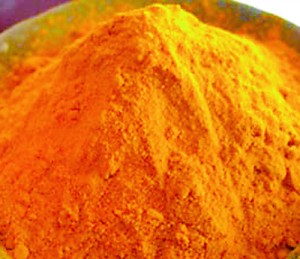Sunday Times 2
Eating a curry ‘can help beat dementia’
Lovers of spicy Indian food could be better equipped to ward off dementia, research suggests.
A compound in the aromatic spice turmeric, a key ingredient in most curries, may hold the key to repairing the brains of people with neurodegenerative diseases such as Alzheimer’s.

Wonder spice: A compound in turmeric, a key ingredient in most curries, may hold the key to repairing the brains of people with neurodegenerative diseases such as Alzheimer's (Reuters)
In laboratory tests, aromatic turmerone promoted the proliferation of brain stem cells and their development into neurons.
It could now help scientists develop treatments for conditions in which brain cells are lost, including Alzheimer’s and stroke.
Lead researcher Dr Adele Rueger, from the Institute of Neuroscience and Medicine in Julich, Germany, said: ‘While several substances have been described to promote stem cell proliferation in the brain, fewer drugs additionally promote the differentiation of stem cells into neurons, which constitutes a major goal in regenerative medicine.
‘Our findings on aromatic turmerone take us one step closer to achieving this goal.’
The scientists examined the effect of aromatic turmerone on endogenous neutral stem cells (NSCs) found within adult brains.
NSCs go on to develop into neurons, and play an important role in recovery from neurodegenerative diseases.
At certain concentrations, the turmeric compound boosted the proliferation of rat foetal NSCs by up to 80 per cent, and increased the speed at which they matured.
In living rats, injections of aromatic turmerone led to the expansion of two key brain regions, the subventricular zone (SVZ) and hippocampus.

Yummy: Turmeric could now help scientists develop treatment for neurodegenerative diseases (Reuters)
Both are sites in adult mammalian brains where neurogenisis – the growth of new neurons – is known to occur.
The findings are published in the online journal Stem Cell Research & Therapy.
Aromatic turmerone is the lesser-studied of two major bio-active compounds in turmeric. The second, curcumin, is a well known anti-inflammatory agent and reputed to have anti-cancer properties.
Dr Laura Phipps, from Alzheimer’s Research UK, warned the findings ‘are a long way from determining whether this compound could help fight diseases like Alzheimer’s.
‘It’s not clear whether the results of this research would translate to people, or whether the ability to generate new brain cells in this way would benefit people with Alzheimer’s disease.
‘We’d need to see further studies to fully understand this compound’s effects in the context of a complex disease like Alzheimer’s, and until then people shouldn’t take this as a sign to stock up on supplies of turmeric for the spice rack.
‘The death of brain cells is a key feature of Alzheimer’s, and investment in research is crucial to understand how this cell death occurs and how to intervene.
© Daily Mail, London

